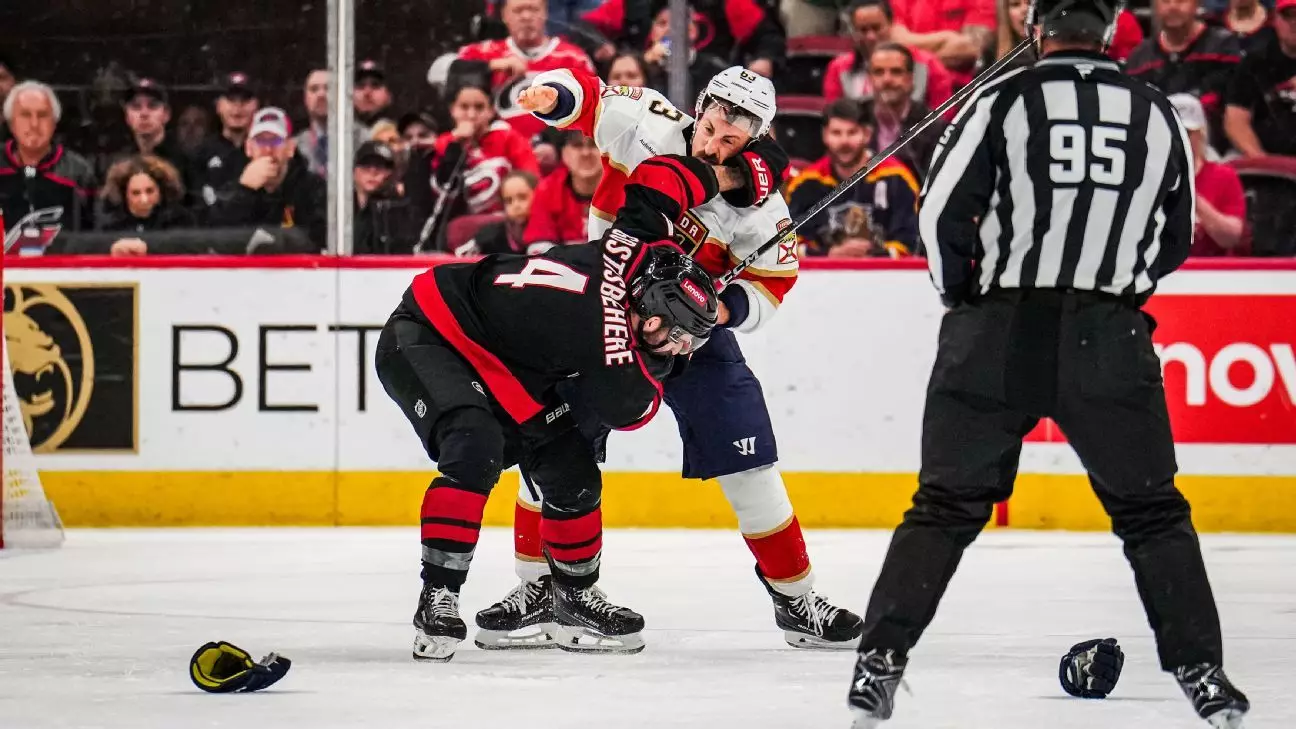Mastering the Mental Game: A Deep Dive into the Hurricanes’ NHL Strategy
Every hockey fan knows that the NHL playoffs aren’t just a test of skill and physical prowess—they’re a mental battlefield. The Carolina Hurricanes are currently navigating this high-stakes environment as they face off against the Florida Panthers in the Eastern Conference finals. Having lost Game 1, Coach Rod Brind’Amour is keenly aware that controlling emotional reactions, particularly retaliatory penalties, is crucial for reclaiming momentum in the series. This isn’t merely a small tweak; it’s an essential shift in mindset that could define their path forward.
I’ve been following the Hurricanes for years, and I can tell you, this team has always played with heart. But sometimes, that passion can get the best of them. As fans, we’ve seen how crucial a level-headed approach is during playoffs. Teams that manage to keep their cool often snatch victory from the jaws of defeat. It’s fascinating to watch how these athletes balance aggression with discipline—something that’s easier said than done when emotions run high on the ice.
This current situation with the Hurricanes reminds me of past seasons where their tempers flared at critical moments. It’s almost like watching a suspense thriller unfold in real-time. You never know when a minor scuffle on the ice might escalate into a pivotal turning point in the game. Understanding how to manage these emotions isn’t just about avoiding penalties; it’s about strategic foresight and maintaining focus on what truly matters—winning.
Key Takeaways
- The mental aspect of hockey is as vital as physical skill during playoffs.
- Emotional control can prevent costly penalties and maintain game flow.
- Strategic adjustments based on psychological resilience are necessary for success.
The Impact of Penalties on Game Flow
In playoff games, every penalty can shift the tide dramatically. For the Hurricanes, an ill-timed retaliation in Game 1 highlighted how losing composure can lead to disastrous outcomes. Up until this point, their penalty kill was impressive, having stopped nearly all power plays at home. Yet, allowing Florida to convert two out of three opportunities exposed a vulnerability that must be addressed immediately. Misjudging an opponent’s capabilities can have ripple effects throughout any series.

Captain Jordan Staal has emphasized this need for clarity and precision in their strategy. His comments serve as a reminder that reducing errors is essential for playoff success. This situation demonstrates the fine line coaches walk between promoting aggression and instilling discipline. Finding that balance is tricky but absolutely necessary if they hope to advance further in the playoffs.
Responding to Provocation: A Delicate Dance
Throughout any intense game, provocations are bound to happen, and how players respond can change everything. Take Aho’s roughing penalty—while it hurt the team, not every response needs to be negative. Later on, defenseman Shayne Gostisbehere handled Florida forward Brad Marchand’s aggression by drawing a double minor on him instead. This exchange proves how psychological tactics can shift gameplay dynamics without resorting to retaliation.
Florida’s ability to absorb such provocations without retaliating offers them a competitive edge. Their history of handling physical play effectively serves as a blueprint for others aspiring to go deep into playoff territory. Even under constant pressure, goalie Sergei Bobrovsky exemplified composure by not retaliating against aggressive attacks—a testament to the power of maintaining poise under stress.
Looking Ahead: Strategic Adjustments for Game 2
As they prepare for Game 2, the Hurricanes face a critical test: Can they embody Brind’Amour’s lessons on emotional restraint? Past struggles against seasoned teams like Florida highlight their need for strategies rooted not just in skill but also psychological strength. It’s about more than just tactical changes; it’s about showcasing each player’s mental conditioning throughout this pivotal game.

If they channel their aggression positively rather than reactively, they stand a chance at turning things around against Florida. Redirecting focus toward defensive pressures and converting emotional energy into performance will be key. Each player must understand that playoff victories often result from strategic finesse rather than brute force or emotional outbursts—a lesson truly worth learning as they continue their playoff journey.
Final Thoughts
The mental game is indeed where championships are won or lost—especially come playoff time in the NHL. As we anticipate each nail-biting moment ahead between Carolina and Florida during these crucial matches ahead—it’ll be interesting seeing who manages better control over both puck possession and emotions alike! Whether cheering from home or within stadiums packed full fans—we’ll all witness firsthand why mastering this mental aspect remains critical towards achieving ultimate glory!
NHL Playoffs
Carolina Hurricanes
mental strategy
emotional control
hockey tactics


Leave a Reply